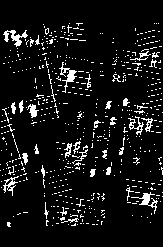 WE've MOVED
WE've MOVED
see new address and contact email in ABOUT US
Building Stronger Improvising Communities
by Dana Reason
| Dana Reason, improvisor-composer-pianist, organized the UCSD Symposium, "Improvising Across Borders" ( April 9-11, 1999 ) | ||
As a practitioner of improvised music I am often concerned by the difficulty in locating journals, scholarly research, and academic curricula dedicated to the fields of improvised musics. Not only is it a task to get one's hands on these articles, but more often then not, many of the articles that surface are rather journalistic in their approach--which, for the most part does not allow the improvisers to really articulate concerns, visions, and political ideas embedded in or surrounding musical contexts because "good" journalism tends to focus on the romanticization of personal anecdotes to sell magazines. Besides the apparent lack of available literature, perhaps it is improvisers themselves who are resisting the emergence of discourses. Speaking from my own experience, during rehearsals I occasionally stop playing in order to discuss the current music or experience. Although responses differ, many musicians express discomfort when playing stops and talking starts. It may be that this is a question of gender, given that many of my ensemble experiences are with men. Of course, there are other possible sources of this resistance to discussion. For some, speaking about improvisation constitutes a betrayal of the gatekeepers of the practice, or of its practitioners. For others, there is a skepticism and mistrust about academicism. Certainly no single answer can speak to the uniqueness of each individual's reticence, or provide and explanation for any discomfort. These attitudes, however, have made me question whether I was alone in thinking that "talking music" played an important role in advancing vital information about the art of improvisational practices. I do wish to counter some of the more dominant naive mythologies that suggest that there is nothing to talk about regarding the subject of improvised music traditions or that improvised music just happens. Thus, my own need to discover others-- practitioners, philosophers, critical and political theorists who also shared a desire to exchange histories, theories, ideas, perceptions, and personal experiences beyond sonic articulation itself--provided the spark that ignited the Improvising Across Borders Symposium. I soon realized that my colleagues Michael Dessen, Jason Robinson, Sean Griffin, and Professor George E. Lewis, among others also shared my concerns, so we organized ourselves in preparation for the Symposium. Along with over one hundred other participants in the weekend event, my colleagues and I quickly realized that we were not alone with our thoughts and that there indeed existed diverse, and vital communities that just needed an invitation to get together. Since I share many of LaDonna Smith's wonderful insights, and memorable highlights of the symposium, I will not provide a review. However, in my opinion the symposium is not intended to be a one time event and I hope that the participants who were from diverse backgrounds socially, economically, racially and culturally, will organize themselves to create even stronger presences in their communities. Michael Dessen has already started a web-site at the following address http://www.improvisingacrossborders.webprovider.com in the hope of fostering the creation of a global improvisers network. We invite those who attended, those reading this article, and any other enthusiasts, to visit the site and join this list-serve. For me, helping people become aware of the embodiment of their own creative spirit articulated through music, among other things, is important for the survival of healthy people. I also believe that creating bodies of literature to include critical, analytical and experiential writings about improvisation will assist audiences in understanding the interactive nature, complexity and necessity of improvisation in their lives and communities. Although one can not overlook the political, racial, and cultural barriers that have acted to silence improvising communities, perhaps it has been a certain unwillingness on the part of practitioners themselves to speak up and out for improvised music traditions that have placed these musics at the margins of twentieth century music and music education. Fortunately, community organizations such as the AACM, the Bay Area Improvising Musicians and other improvising networks; the diverse music calendars from cities like Chicago, Seattle, Toronto, Montréal, Vancouver, New York, and Boston as well as academic institutions that include improvisation in their curriculums such as: the University of California, San Diego, Bard College, Mills College, Wesleyan, and York University, are together changing and challenging old paradigms and myths about improvisation. |